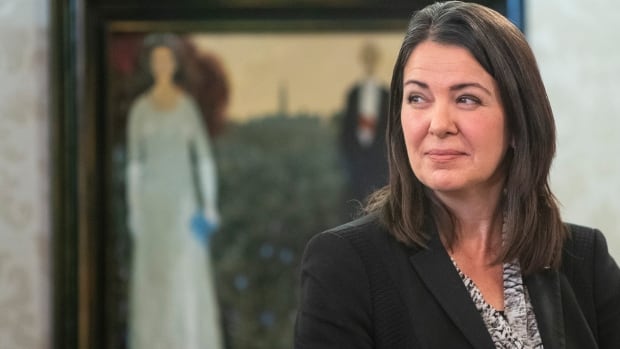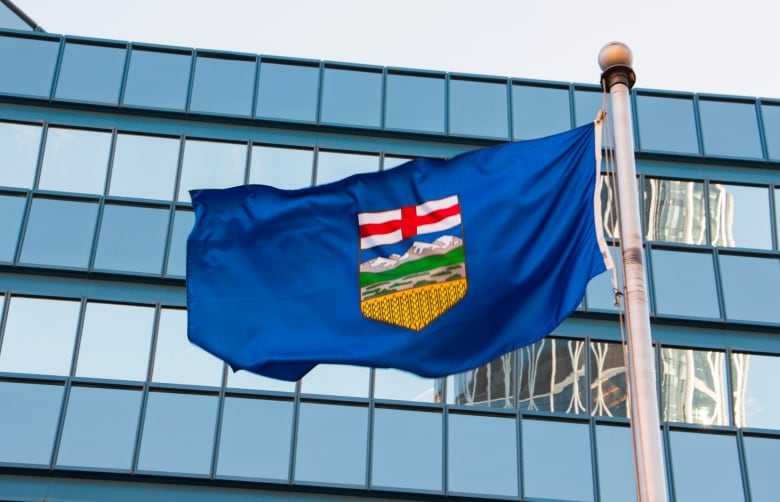
EDITOR’S NOTE: CBC News and The Road Ahead commissioned this public opinion research in mid-October, starting six days after Danielle Smith won the leadership of the United Conservative Party.
As with all polls, this one is a snapshot in time.
This analysis is one in a series of articles to come out of this research. More stories will follow.

Hours after her byelection victory last week, Danielle Smith aimed her Twitter feed at fighting inflation. Among a series of tweets, one stood out: an earnest looking photo of herself listening to a group of women that could pass for a stock image of suburban moms. The tweet’s infographic vowed to review utility costs and targeted government relief at the cost-of-living.
Her long-awaited pivot was taking on a more solid form — from grievance politics popular with her conservative base to the everyday concerns of rising food and fuel costs, and the bottlenecks in hospital emergency rooms across the province.
In her byelection victory speech, she vowed to take “unprecedented and substantial action to help Albertans and their families.”
Today, our government took action on affordability:<br><br>☑️Better income supports for seniors<br>☑️Re-indexing AISH for our most vulnerable<br>☑️Targeted cost-of-living relief<br>☑️Immediate review of electricity & utility costs<br>➕More!<br><br>Read: <a href=”https://t.co/p02dbhh3jP”>https://t.co/p02dbhh3jP</a><a href=”https://twitter.com/hashtag/abpoli?src=hash&ref_src=twsrc%5Etfw”>#abpoli</a> <a href=”https://twitter.com/hashtag/ableg?src=hash&ref_src=twsrc%5Etfw”>#ableg</a> <a href=”https://t.co/0PWZMJaF5V”>pic.twitter.com/0PWZMJaF5V</a>
—@ABDanielleSmith
Smith ignited the governing United Conservative Party’s (UCP) leadership race with fiery anti-Ottawa rhetoric and a proposed sovereignty act.
Then, on the day she ascended to the province’s top job, Smith sparked even more controversy with her contentious claim that unvaccinated people were the “most discriminated against group” — keeping in line with her views of COVID restrictions that only a minority of Albertans seem to share.
Unlike her predecessors, Smith did not get the usual honeymoon glow of a new leader. CBC News’s recent Road Ahead poll suggests the NDP leads the UCP in voter preferences, 47 per cent to 38.
A deep dive into the data shines a spotlight on the disconnect between Smith’s rhetoric and the more moderate values of most Albertans — especially in urban areas — on issues ranging from the environment to the handling of the pandemic. The UCP’s path to victory appears steep. It requires picking up moderate voters, who prefer the NDP right now by more than 30 percentage points, the poll indicates.
“You see a population that’s becoming more tempered, more moderate, more centrist at a time where it seems the governing party is becoming more militant,” said pollster Janet Brown, who conducted the research for CBC News.
Brown and other longtime Alberta political watchers say it would be politically strategic for Smith to now pivot toward the values of most of the Prairie province’s voters.
But can she?
Values and Alberta voters
The CBC News poll asked a random sample of 1,200 Alberta voters more than a dozen “value” questions, ranging from the role of the government in the economy to social issues such as immigration and equality.
And while politicians’ barbed words and the pugilistic pandemic discourse may make it seem like our politics is bitterly polarized, the polling data suggests Albertans are not as divided. A big mushy middle of Alberta voters retain pretty centrist values.
“There are robust groups at either end of the political spectrum, and those are the people whose voices tend to be heard in the public sphere. The bulk of voters in the centre are listening,” said University of Calgary political scientist Lisa Young, who reviewed the findings.
Using 15 poll questions, we extracted five factors — or underlying constructs — that are correlated or grouped together: economic conservatism, populism, western disaffection, cultural conservatism, and energy and the environment.
We then grouped or clustered these value scores to understand how political values shape and possibly predict vote choice in Alberta. We divided Alberta into five groups of voters:
-
The consistent left comprises 15 per cent of Albertans. This group is consistently left-wing on all values, ranging from environment to the government’s role in the economy. Not surprisingly, 93 per cent of this group intends to cast a vote for the NDP.
-
The consistent right makes up 18 per cent of Alberta voters. This cluster’s values are consistently right-wing on issues such as immigration or doing more for Indigenous people. The UCP has a lock on 71 per cent of these voters.
-
The moderate middle comprises the biggest group — 42 per cent of voters. This cluster, for the most part, holds centrist values, but lean slightly to the right on culturally conservative values such as immigration and more help for Indigenous people. It also tilts slightly left on economic issues, energy/environment, and western disaffection. Fifty-two per cent of this large group says it will vote NDP, while 20 per cent will vote for Smith and the UCP — a substantial lead for the opposition party among this pivotal voter segment. This group tends to live in urban areas. The areas outside Edmonton and Calgary are frequently mislabeled as “rural Alberta.” But according to this data, people in Red Deer have more values in common with residents of Calgary and Edmonton than with people in a small town such as Coronation east of Red Deer.
-
The less culturally conservative right makes up 14 per cent of voters. This cluster tilts right on most value dimensions, except for culturally conservative values, where it leans slightly left. Also, it is more right-wing than the second cluster on economic issues, energy/environment, and western disaffection. Most of this group (81 per cent) intend to vote UCP.
-
The potential swing voters encompasses 11 per cent of Alberta voters. This group has a mix of value positions: fairly left on populism and cultural issues but fairly right-wing on western disaffection, and right-leaning on the energy/environment. The vote choice for this group favours the NDP, with 51 per cent, and the UCP with 18 per cent. Interestingly, 12 per cent of this group are so-called “orphaned voters,” that is, they did not offer a preferred party when asked during the survey. The remaining 11 per cent of this group intends to vote for other Alberta parties, including the Liberals, Greens and Alberta Party.
No doubt, group three — the “moderate middle” — is the big prize in next May’s expected provincial election.
The politics of values
Expect both the UCP and the NDP to try to capture “the moderate middle” group identified in CBC News’s data analysis.
“This group really is going to decide the election, and the direction of the province for the foreseeable future,” Young said. “They’re flexible … they’re open to moving, voting for a party that they see as being closer to their values, but also competent.”
Smith’s supposed pivot to inflation — and what her team perceives that suburban moms want — suggests the UCP intends to go after moderate women, a sizable group of voters.
“My sense is that what she’s got in mind is that there are suburban women who are available to her … with a hope that maybe they will bring their spouses with them,” said Young.

Undoubtedly, the NDP will continue to aim its political messaging at this group, too. This group — and especially moderates in Calgary — will likely determine who wins next May’s vote.
Remember, New Democrats lead the UCP by 32 points in this moderate group of voters. No surprise, the party’s recent messaging has focused on affordability, health care and an economic diversification plan.
“They need to continue to present themselves as a competent centrist alternative, a government in waiting. Rachel Notley should act like she’s premier already,” added Young.
Brown calls the NDP’s large lead with middle-of-the-road voters historically notable, pointing out that traditionally the old Progressive Conservative Party was the “big tent party” that moved with mainstream public opinion, while the NDP’s policies were more guided by its core progressive ideology. Brown says that appears to have flipped.
“We’ve got the NDP, who is trying to broaden their appeal, whose policies are closer to mainstream public opinion. And we’ve got the UCP, who is on the side of more controversial issues, things that could prevent them from getting elected in 2023,” said Brown.
She also thinks the UCP’s best play for votes is to better align its rhetoric with the majority of Albertans’ values.
“The reason that the UCP is not very popular right now is because they’re not talking about the right issues,” said Brown.
But Brown stresses that it’s taken Smith a while to switch from talking about sovereignty and COVID-19 to other issues and values that mirror the majority of Albertans’ attitudes.
“She seems to be resistant to making that pivot. So the question will be, will Albertans see this pivot as genuine or will they see it as just a cynical attempt to get elected?”
The CBC News random survey of 1,200 Albertans was conducted using a hybrid method between October 12 and 30, 2022, by Edmonton-based Trend Research under the direction of Janet Brown Opinion Research. The sample is representative of regional, age and gender factors. The margin of error is +/- 2.8 percentage points, 19 times out of 20. For subsets, the margin of error is larger.
The survey used a hybrid methodology that involved contacting survey respondents by telephone and giving them the option of completing the survey at that time, at another more convenient time, or receiving an email link and completing the survey online. Trend Research contacted people using a random list of numbers, consisting of half landlines and half cellphone numbers. Telephone numbers were dialed up to five times at five different times of day before another telephone number was added to the sample. The response rate among valid numbers (i.e. residential and personal) was 16.3 per cent.